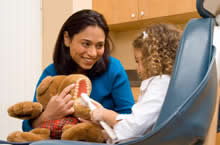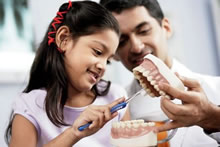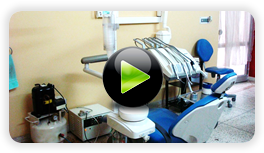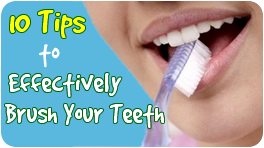 Throughout your child’s life, they will have two sets of teeth: primary (baby) teeth and secondary (permanent) teeth. The primary teeth begin to appear around ages 6-8 months, and all 20 are usually in place by age 3.
Throughout your child’s life, they will have two sets of teeth: primary (baby) teeth and secondary (permanent) teeth. The primary teeth begin to appear around ages 6-8 months, and all 20 are usually in place by age 3.
Permanent teeth will begin to grow around age 6, and with the exception of wisdom teeth, are all present between ages 12 and 14. The next teeth to grow in are the 12-year molars and finally the wisdom teeth. Wisdom teeth typically begin breaking through from age 17 and on. The total number of permanent teeth is 32. Few people have room for all 32 teeth, which is why wisdom teeth are usually removed.
Your child’s front teeth are called incisors. The sharp "fang-like" teeth are canines. The next side teeth are referred to as pre-molars or bicuspids, and the back teeth are molars. The permanent teeth are the ones your child will keep for life, so it is important that they are brushed and flossed regularly and that periodic check-ups by a pediatric dentist occur.
Early Childhood Caries
 "Early Childhood Caries" develops when children are put to bed with a bottle/sippy cup. This extensive decay in a young child is difficult and expensive to treat. To prevent "Early Childhood Caries," never allow your child to fall asleep with a bottle/sippy cup containing milk, formula, fruit juice, or sweetened liquids. We have observed the same pattern of decay in children who sleep with their mother and nurse "at will" through the night. We suggest that after each feeding you wipe your child’s teeth with a gauze pad or use a toothbrush to clean the teeth.
"Early Childhood Caries" develops when children are put to bed with a bottle/sippy cup. This extensive decay in a young child is difficult and expensive to treat. To prevent "Early Childhood Caries," never allow your child to fall asleep with a bottle/sippy cup containing milk, formula, fruit juice, or sweetened liquids. We have observed the same pattern of decay in children who sleep with their mother and nurse "at will" through the night. We suggest that after each feeding you wipe your child’s teeth with a gauze pad or use a toothbrush to clean the teeth.
Baby’s Dental Development
Although the first tooth appears in the mouth around 6 months of age, the baby’s primary teeth ("baby teeth") are nearly completely formed at birth. Birth also marks the beginning of the formation of a baby’s permanent teeth. This process will continue for the next 13 years or so. During tooth formation, proper health and an optimal fluoride program offer the best chance for healthy teeth.
 Healthy teeth are important to your child’s overall health. From the time your child is born, there are things you can do to promote healthy teeth and prevent cavities. For babies, you should clean teeth with a soft, clean cloth or baby’s toothbrush. Avoid putting the baby to bed with a bottle and check teeth regularly for spots or stains.
Healthy teeth are important to your child’s overall health. From the time your child is born, there are things you can do to promote healthy teeth and prevent cavities. For babies, you should clean teeth with a soft, clean cloth or baby’s toothbrush. Avoid putting the baby to bed with a bottle and check teeth regularly for spots or stains.
For all children, you should
- Brush teeth with a fluoride toothpaste
- Provide healthy foods and limit sweet snacks and drinks
- Schedule regular dental check-ups
Forming good habits at a young age can help your child have healthy teeth for life.



